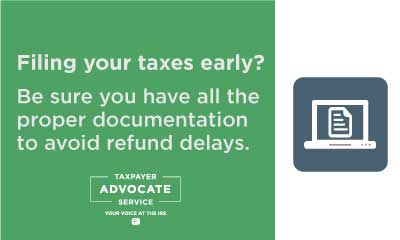

This year, the IRS filing season begins on February 12. That’s the date when the IRS will begin accepting 2020 individual income tax returns.
Filing early, before you have all your final income statements (from your employer, from self-employment income, from investments, and from other sources of income) may cause you issues in the long run.
Why is that? Because the IRS does cross-checks to verify income and also to prevent fraud. Thus, if you file without having all your documentation, you may be underreporting income to the IRS. If the IRS identifies discrepancies between its records and what you report on your return, your return will be pulled from the regular processing stream and put aside. Then the IRS will begin issuing notices and letters to resolve the discrepancies, which inevitably delays any refund you may be claiming.
For more about preventing tax return processing and refund delays, see our tips to help prevent common tax return filing issues and refund delays. To help you resolve these issues, should you encounter this situation, see our Issues and Errors Get Help pages.
You can also read more about the IRS verification processes, called the Pre-Refund Wage Verification and Taxpayer Protection Program processes, in the current and previous Taxpayer Advocate Annual Reports to Congress.